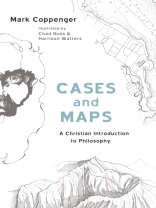A dying man hires the services of a cannibal; a customs official insults a world-class sculptor; a farmer complains that low-flying bombers are killing his chickens; two rock groups claim the same name; a monkey takes a selfie; and a minister with mail-order credentials performs a wedding. The resulting court cases (and sixteen others) serve to introduce a wide range of philosophical notions (such as libertarianism, speciesism, and speech acts).
Next, a subway employee draws a revolutionary map; a mountain loses its name; a strange cineplex puts people in each others’ movies; the art museums of Madrid loom over neighboring buildings; a nautical chart guides seamen into a Connecticut port; and Jerusalem stands ‘due north’ of the Mediterranean. These maps (twenty-three in all), whether real or imaginary, introduce yet other philosophical notions (such as pragmatism, universals, and paradigms). Along the way in both sections, we meet a wide range of thinkers, from Plato to Aquinas to Hume to Kant to Searle.
The explanations and discussion questions are written from a Christian perspective, inviting believers to join in the perennial dialogue with the conviction that if you don’t have philosophical and theological positions sorted out, then they will have you.
Sobre el autor
Mark Coppenger is Retired Professor of Christian Philosophy and Ethics at Southern Baptist Theological Seminary. He has a B.A. from Ouachita, a Ph.D. from Vanderbilt (both in philosophy), and an M.Div. from Southwestern. He’s taught full time at Wheaton, Midwestern, and Southern; been senior pastor for churches in Arkansas and Illinois; served as an infantry officer; and done short-term missionary stints on five continents.












